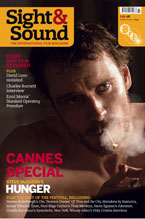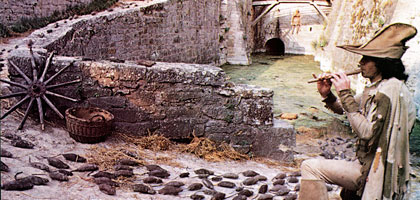
NOZONE: Boomtown rats
DVD Review: Pied Piper

Jacques Demy's interpretation of the Pied Piper fairytale is deeper and darker than you might expect, says Tim Lucas
The Pied Piper
Jacques Demy; France/UK 1972; Legend Films/Region 1; 90 minutes; Aspect Ratio 1.78:1 (MFB 464)
Legend Films, a San Diego company specialising in film restoration and colourisation technology, has licensed a number of long-coveted cult titles from the Paramount vaults, including Phase IV (the only feature directed by revered graphic artist Saul Bass), Hammer's The Man Who Could Cheat Death, the Amicus classic The Skull (Freddie Francis' finest work as a director), William Castle's mob comedy The Busy Body, and George Pal's biopic Houdini, starring Tony Curtis and Janet Leigh. The discs, available from the legendfilms.net website or through retail outlets, are remarkable for their unusually film-like transfers, which make one more conscious of the digitally overbaked, chromatically distorted standards of most other DVD releases.
Of particular interest among Legend's Paramount holdings is Jacques Demy's The Pied Piper, made in 1972 in the fairytale vein of his previous The Magic Donkey (1970) but with musical leanings carried over from his beloved The Umbrellas of Cherbourg (1964) and The Young Girls of Rochefort (1967). Scripted by Demy and the unusual ?edgling team of Andrew Birkin (The Name of the Rose) and Mark Peploe (The Passenger), it's based on the famous Grimm Brothers fable in which the German villagers of Hamelin, beset by the Black Plague, agree to the vagabond Piper's offer to free their town of plague-carrying vermin for an agreed sum, which is withheld once the job is done. In the original unvarnished fable, the Piper retaliated by musically luring the children of Hamelin to their deaths in the same lake where the rats had been drowned; in other retellings, the youngsters were simply led astray and returned once the Piper was paid a still more handsome fee. Gentled by the lilting musical contribution of Donovan (who plays the Piper), Demy's film isn't quite so harsh as the Grimms' version but, if it pulls some of its punches, they are felt nonetheless.
Set in the 13th century, it follows the theatrical caravan of Mattio (Keith Buckley) and his pregnant wife Helga (Patsy Puttnam), along with their children and a pilgrim (Clive Elliott) met in a plague-devastated town, to Hamelin. The village is preparing for the wedding of burgomaster's son Franz (John Hurt) to Lisa (Cathryn Harrison), the young daughter of a baron (Donald Pleasence) who has arranged the marriage much as he connives with officials of the Catholic Church, in hopes of realising his dream of building a cathedral. Lisa, whose bedridden, pre-marital torpor has led the town bishop (Peter Vaughan) to recommend she be given the last rites, is not actually ill, merely depressed at the curtailing of her true romance with Gavin (Jack Wild), an aspiring painter who assists the physician Melius (Michael Hordern). She is roused from her indolence by the music of the mysterious Piper, and the wedding proceeds as planned - until rats begin to inundate the town. Melius' warnings of impending plague are dismissed by church officials, who consider it heresy (indeed a 'Jewish plot') to claim that such a calamity could have a natural cause - an offence for which Melius is conveniently arrested when he refuses Franz's demand to create a batch of worthless gold to entice local men to march off to a holy war.
Photographed in pleasingly muted earth tones by Peter Suschitzky (now David Cronenberg's cameraman of choice), the film's almost complete reliance on long and medium shots (I noted exactly one close-up in the whole 90 minutes) and exclusive use of live, non-optical special effects give it the feel of a theatrical performance blessed with exceptional talent. The top-drawer cast also includes Roy Kinnear (playing in less buffoonish form than usual) and Diana Dors as the burgomaster and his wife.
Though it received an 'A' certificate in Britain and a 'G' rating in America, The Pied Piper is a remarkably kindred work to Ken Russell's X-rated The Devils (1971), being in its own way an exposé of historical connivings between political Church and pious State, meant to resonate with the anti-establishment tenor of its times - which it still does. (This comes into sharpest focus when the pilgrim notes that people "don't know how to do anything any more. There's no craftsmanship, no standards - just greed.") Here, too, a tribunal of priests in pointed cowls sentences a good man to be burned at the stake ("To take medicine from a Jew, my lord, is to enter into a contract with Lucifer!") and, as said sentence is carried out, hundreds of rats burst forth from an oversized wedding cake in the likeness of the baron's projected cathedral - a moment whose symbolic overstatement Russell would doubtless approve.
